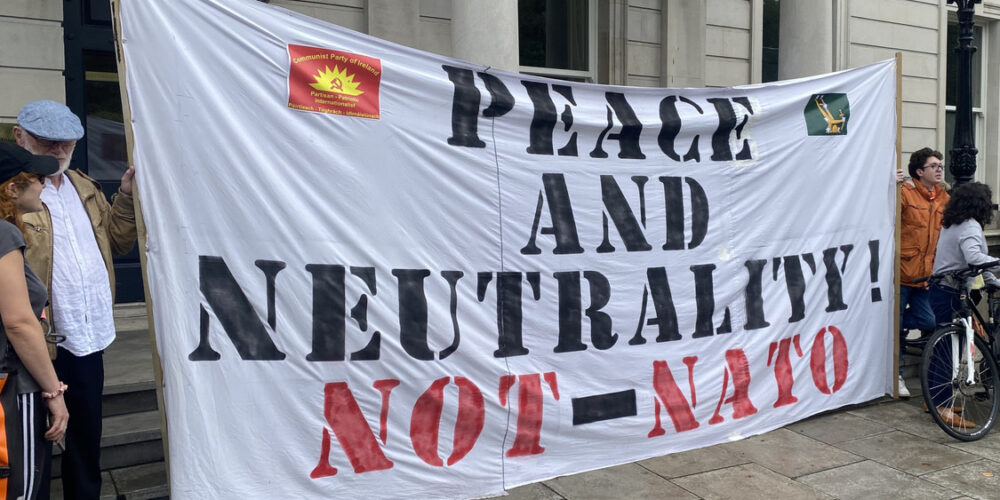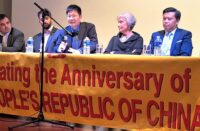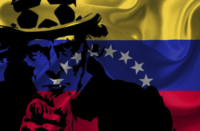One of the latest in a series of high-profile attacks on Irish neutrality came from the Minister for Health, Jennifer Carroll MacNeill, at a Béal na Bláth Michael Collins commemoration. In concert with the media campaign for the removal of the Triple Lock, MacNeill and the rest of the government speak of the mechanism as an obstacle to Irish sovereignty; this perverse inversion of truth needs to be addressed.
The idea put forward is that the Dublin Government needs to free itself from the Triple Lock to be able to freely choose where to deploy troops. The notion of freedom in that narrative is the exact same as the individualist freedom neoliberal voices speak of in ‘Western democracies’: everyone is free to do everything in principle; in practice, what everyone does is to be governed by buying power and the force of the market. These forces, however, are naturalised—in other words, they are not spoken of because they are accepted as a part of reality.
When MacNeill or Cathal Berry speak of the 26-county Irish state being free to exercise its sovereignty after the removal of the Triple Lock, that in practice means the ability to join the imperialist market and put its sovereignty on it as a neatly-packaged commodity.
Just as the naturalised force of capital is blended into the background of individual freedom of choice, the universal grip of US imperialism with its European, British, and NATO components is blended into the background of defence, sovereignty, and international politics. Freedom from the UN is freedom to follow the financial capital of imperialism in its expansionist drive.
It is, once again, the individual freedom of Micheál Martin to represent Ireland in the coalition of the willing for Ukraine—not representing the people of Ireland, but international capital and its local enablers. Freedom for capitalist class interest, by definition, cannot be anything but a severe restriction on working-class interest. As the budget spreadsheets drain health, housing, and education to feed into defence spending lists that are drafted far from Dublin, working-class interests remain under attack.
The commodification of sovereignty for full imperial capture, however, does require stripping the Irish characteristics from it. The imperialist drive to place Ireland firmly within its colonial order has to put in the work of dismantling Ireland’s postcolonial experience and its anti-imperial past. To be shaped into a brick within the imperial wall, Ireland’s specific conditions need to be shaved off and trimmed, and the structures that remain must be generic and devoid of ideas of class, national liberation, or justice.
It is through this lens that we must look at the Triple Lock as a legislative mechanism and the idea that it represents. It is not merely a voice of protest against injustice and the imperialist war machine; it is an act of active resistance to it. The contradictions have been amplified enough for everyone to see the European Union’s face of a military alliance: empire’s finance cannot circulate without empire’s military.
The active efforts of the Irish government, under the pressure of the US and EU imperialist ratchet, to do away with safeguards of Irish refusal to enlist into the imperial order are a sign of the power that we do hold. These mechanisms are a result of resisting attempts to drag Ireland into military alliances in name and in practice—a result of saying no to projects of compliance with forces engaged in the colonisation, exploitation, and destruction of societies, environment, and life.
Commitment to diplomacy has been ridiculed by our government and commentariat for years, despite the obvious truth of how wars end and how states in the 21st century resolve issues. Commitment to peace and cooperation has been ridiculed by those who defend the indefensible racket of the military industry. Yet, it is their efforts that are ridiculous.
If they had an argument, they would not have to resort to lies and made-up hypothetical situations; it is through these hypotheticals—devoid of history, material conditions, or logic—that they create an illusion of a different world that Ireland is supposed to join. The world they conjure in their fantasies does not exist. The one that exists needs a neutral Ireland.






